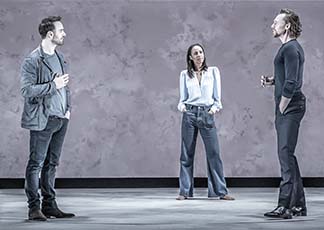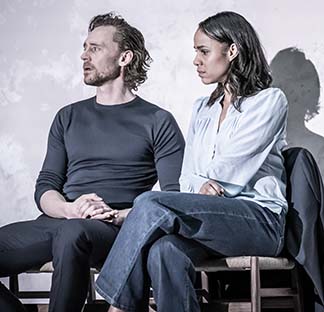By Lucy Komisar
In 1978, Harold Pinter wrote a play inspired by his seven-year affair in the 1960s with Joan Bakewell, a BBC presenter. He was married at the time to actress Vivien Merchant and left her in 1975 after 20 years and one son. He married author Antonia Fraser in 1980.
The characters in this triangle are all guilty of betraying each other, which is perhaps Pinter‘s way of assuaging guilt. And also to perhaps mock the London literary and arts world.

It opens two years after the of end of an affair between Emma (Zawe Ashton), a gallerist, and Jerry (Charlie Cox) an agent, who happens to be a friend of her publisher husband, Robert (Tom Hiddleston).
Ashton‘s Emma is cool, Cox‘s Jerry is not very polished, rather a hustler, Hiddleston‘s Robert is urban, sophisticated.
Emma and Jerry are so civilized. Drinking beers. The bottles are real props on a stark minimal set with just two wood slatted and raffia chairs

“How are you?” Emma is giggly. Do they think of each other? There will be minor domestic memories such as Jerry throwing her kid in the air at her house, or was it his house? The affair lasted seven years. They are all in their 30s.
He asks if she is seeing Casey, who turns out to be a writer he is representing and Robert declined to publish. The assumption is that changing partners is expected.
He remarks that none of their friends knew about their tryst in Kilburn, a town outside London. Turns out Robert did know. And that he had affairs with other women.
The most novel thing about the play is that it moves backwards in time, so you see what happened two years ago, four years ago, etc.
As directed by Jamie Lloyd, this long affair seems surprisingly bereft of passion, cool, lacking emotion. The characters are rigid in soul and spirit which makes you wonder why any of them hopped into other’s beds. They appear to like their own partners, aren‘t bored. Is this just a London literary and arts game?

An interesting plot twist is that Robert discovered the affair when Jerry stupidly sent a letter to Emma at American Express in Italy where the married couple was on vacation. Remember when you could get mail there? Now, of course, there would be emails carelessly left on a phone.
Curiously, Emma is always barefoot, as if she is home-bound when we know she runs a gallery. She is quite sexy in a self-possessed way, but I can‘t figure what she sees in Jerry.
There are odd supposedly ordinary moments of the two men having lunch and nattering on about playing squash. Robert knows; Jerry doesn’t know that Robert knows.

Some cat and mouse conversations involve the three. We see the overriding duplicity between and among them.
I first saw “Betrayal” in 2000 in a David Leveaux production at the Roundabout Theatre and found it enthralling. Liev Schreiber played Jerry, Juliette Binoche was Emma, and John Slattery portrayed Robert.
Then in 2013, I saw Mike Nichols‘ disappointing staging at the Ethel Barrymore Theatre with Rafe Spall, Rachel Weisz and Daniel Craig. For all the coupling that was discussed, the sense was of isolation. The characters were so encased in their own selfish desires that they seemed always to speak past each other. Lies upon lies were uttered with a dry economy of language and lack of emotion — at most, some jaded discomfort. A play about a hot love affair left me cold.
The last version directed by Jamie Lloyd recalls the latter production, a non-erotic play about sex. Yes, it‘s about their lies and betrayals, but it all seems rather clinical if you don‘t believe they were ever emotionally connected to each other.
“Betrayal.” Written by Harold Pinter, directed by Jamie Lloyd. Bernard B. Jacobs Theatre, 242 West 45th Street, New York City. 212-239-6200 or 800-447-7400. Opened Sept. 5, 2019, closes Dec 8, 2019. Running time 90 min. 9/9/19.

